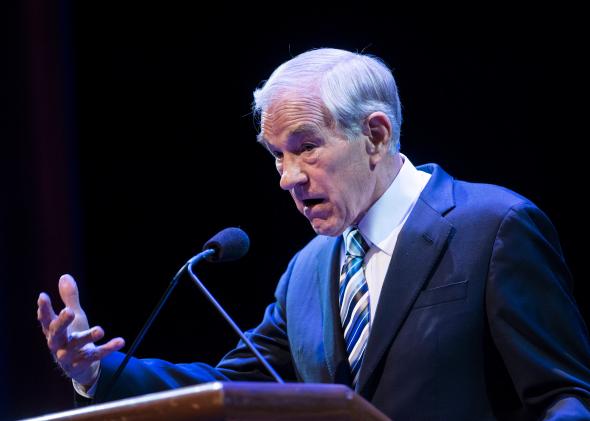Ron Paul and a New Libertarian Rift Over Ukraine

Photo by Brendan Smialowski/AFP/Getty Images
Early this morning, the president of the libertarian group Students for Liberty co-wrote an op-ed critical of Ron Paul's response to the Crimea incursion. Alexander McCobin (whom I worked with briefly when I was at Reason magazine) told readers of the Panam Post that "former Congressman Ron Paul, whose views are interpreted by many as wholly representative of the libertarian movement, gets it wrong when he speaks of Crimea’s right to secede." He went on:
Make no mistake about it, Crimea was annexed by Russian military force at gunpoint and its supposedly democratic “referendum” was a farce. Besides a suspiciously high voter turnout without legitimate international observers, the referendum gave Crimeans only two choices — join Russia now or later. Besides a suspiciously high voter turnout without legitimate international observers, the referendum gave Crimeans only two choices — join Russia now or later.
It’s much too simplistic to solely condemn the United States for any kind of geopolitical instability in the world. Non-interventionists who sympathize with Russia by condoning Crimea’s secession and blaming the West for the Ukrainian crisis fail to see the larger picture. Putin’s government is one of the least free in the world and is clearly the aggressor in Crimea, as it was even beforehand with its support of the Yanukovych regime that shot and tortured its own citizens on the streets of Kyiv.
After Rosie Gray spotlighted the op-ed, I got flashbacks. In 2007 and 2008, when Ron Paul ran for president, the libertarian movement was of two minds about his candidacy. "Two" might be selling it short. Paul, whose political career began in the 1970s as a reaction to Nixonian monetary policy, came from the "paleo" wing of the movement as defined by the late Murray Rothbard and as enforced by the Ludwig von Mises Institute. Later generations of libertarians, generally, were more socially progressive and, while critical of foreign entanglements, constantly looking for alliances in other countries' protest movements. (Go buy a copy of Brian Doherty's history of libertarianism, which was stiffed by critics but has been cribbed by many a reporter since then.)
Students for Liberty was founded in the summer of 2008, after the Paul campaign had (to the surprise of many) created or located countless young libertarians. McCobin, who'd come to D.C. on a Charles Koch Institute fellowship, was its founder. Around that same time, the Ron Paul movement produced Young Americans for Liberty, an outgrowth of the campaign's young voter outreach program—a young activist named Jeff Frazee moved seamlessly from the campaign to the new organization.
The two groups haven't exactly clashed. By 2009, Democrats ran the entire federal government, and the Cato/Koch-type libertarians were in the same foxhole as the Rothbardians. But the tone of McCobin's post is key—he wanted readers to know that Ron Paul, who remains well-known enough to be quoted as a prominent American politician, does not represent all libertarians. YAL has said nothing about Ukraine/Crimea, and Frazee demurred when I asked whether the group had an opinion.
Both groups, both factions in the movement, are currently comfortable with Rand Paul's approach to the crisis. But allies of the Pauls don't exactly thrill when the other faction alerts the media to the fissures.
